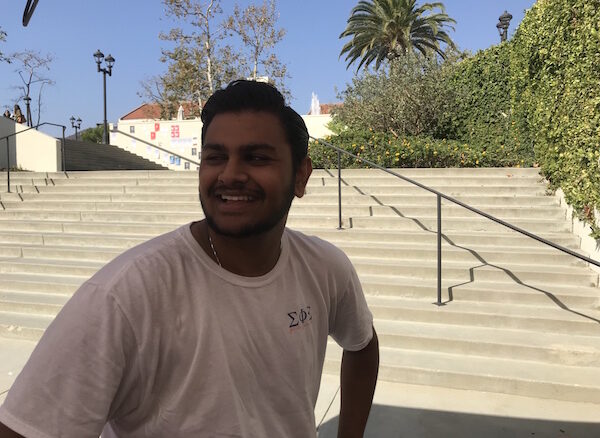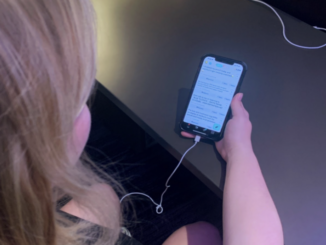
Pepperdine senior Sahil Halai has already started his career in California working as an administration intern for Vibranalysis Inc., a premier consultant firm.
The business major, however, faces a challenge domestic students don’t have to worry about. As an international student from Uganda, he has the opportunity to apply for an initial post graduation, one-year visa to stay in the country to figure out future plans. Halai will be using that extra year to plan whether he will go home or to Europe, as he also has British citizenship.
Regardless of Halai’s plan to move back overseas, he would rather stay in the U.S. and pursue a life here.
“If it was up to me I would stay here for the next five or 10 years,” Halai said, “because of my visa situation I wouldn’t be allowed to make that choice.”
International students apply to U.S. universities knowing the chances of staying are slim, so many do not try. International students have to jump over bureaucratic hurdles throughout their college careers. Most domestic students at Pepperdine don’t know what their international peers go through.
Many international students want to work in the U.S.
The Seaver undergraduate population is made up of about 11 percent international students, according to Pepperdine’s admission facts.
A Pepp Post poll of 38 international students found that 60 percent want to stay in the United States after they graduate.
Thirty-one of those polled said they would want to stay in the United States for graduate school, to be closer to family, or for employment opportunities, among other reasons.
Some 56 percent of students polled want to leave the United States because their families are back home. But 24 percent said they have to go back because their college visas expire.
The poll found that 39 percent of students originally came to the United States for a better education.
Roughly 63 percent of those surveyed said they are not currently working on securing a work or graduate school visa.
The struggles they face
Each student who comes to the United States to study is automatically placed into a visa category called the F-1 visa that allows them to study in the United States, according to Mountain Pacific Association of College and Employers.
Having an F category visa allows a student to study in the United States at any education level, according to the United States State Department. After a student follows the several steps to apply for a visa, they have an interview with a consular officer. After the interview, paying the $160 fee, and turning in all required documents, they are then in consideration for the F-1 visa.
Most students choose to apply for the Optional Practical Training (OPT) for post-graduation. This allows students 12-months to work in a field that applies to their degree in hopes to get another job.
“As an international student, my visa does not allow me to stay here permanently, what I’ll have to do is apply for OPT, which stands for optional practical training,” Halai said. “It allows me to work here, because it is related to what I studied, they let me do it for a year.”
Before a student’s OPT is expired, they can try to obtain an H-1B visa by finding a company that will sponsor them. If a student finds a company that will sponsor them, they can work in the U.S. for three years and apply to work for another three years after that.
During the time that students work in the United States on the H-1B visa, they are usually still planning ahead for their future.
However, obtaining an H-1B visa is a very long and not guaranteed road.
According to Forbes, the only way to qualify for the H1-B visa is for the employee who just graduated to hold at least a bachelor’s degree or have the equivalent work experience in that field. However, from an employer’s standpoint, navigating around the H1-B visa is very challenging. The students are not allowed to apply for the visa on their own, only the employer can.
Regardless of the company’s size or age, it has to petition for one of the 65,000 H-1B visas that will be issued continually every April by the U.S. Citizenship and Immigration Service. It costs over $4,000 to simply apply.
As Homeland Security’s Designated School Official in Pepperdine’s Office of International Students, Judy Lee has seen students struggle with this first hand. Her job is to keep track of the F-1 visa students at Pepperdine and make sure they are following the right protocols during their time in the United States.
“There is that wall of employers that already have a negative idea, ‘if we hire this person we may have to support them through a very complex maze that’s not guaranteed,’” Lee said. “Many employers have already decided of having a policy of not hiring international students.”
New immigration hurdles
Brooke Cutler, director of the Office of International Students, sees international student admission trends change year to year first hand. Cutler said that after 9/11, there was a tremendous increase in international student enrollment in the U.S. Over the last decade the numbers had skyrocketed. However, this year, international student enrollment decreased drastically all around the country.
There is nothing that the universities are doing to cause this downshift in enrollment, Cutler said. Rather, the immigration policies of President Donald Trump’s administration are making people want to study in other countries besides the United States.
Although Pepperdine itself was not drastically affected,, the fear that students will not feel welcome in the U.S. and choose to go elsewhere is very prevalent.
“That is a huge shift in the trend that was happening,” Cutler said. “It is becoming much more difficult to recruit and enroll international students. A lot of that stems from some of the immigration related stuff we are watching and reading in the news.”
Some students don’t want to come to the U.S. at all, because they aren’t sure if they will be forced to leave in the middle of their studies because of all new immigration policies.
“Students come here, they want to come for opportunity, they want to come where they can build experience, where they feel welcome, maybe where they can do an internship and get experience before they go home,” Cutler said. “There has been a lot of media buzz that doesn’t necessarily indicate that the U.S. is the most welcoming place for immigrants.”

Dual citizenships
Seaver College’s international student population comes from more than 10 different countries around the world. Many of these international students at Pepperdine hold dual citizenships.
In some cases, like sophomore economics major Mikaeel Habib, getting into the United States for an education was a lot easier because of his dual citizenship.
“I was born Canadian so I have a Canadian passport, and because my family is Pakistani I adopted a Pakistani passport as well,” Habib said. “It was very helpful being a Canadian, I didn’t have to go through the student visa processing.”
Habib put away the idea of staying in the United States after graduation long ago. He wants to go back home or to Europe post-graduation.
“There is so much more out there, I have been very privileged to travel quite a bit, and there are many other places I would prefer,” Habib said.
Junior psychology major Christel Jacobs has a similar plan. Jacobs plans to use her dual Guatemalan and German passports to eventually study abroad in Europe and move back home to Guatemala. Jacobs said the culture in the United States is so different than in Guatemala, from simple things like humor, to how you greet people, that makes her miss home.
“It’s the simple things,” Jacobs said. “Humor, interactions, greetings, I was aware it was different from back home but I didn’t think it would affect me as much as it did.”
There are students, however, like Leyi Shen, a freshman dual sports administration and sociology major , who wants to stay in the United States regardless of his dual citizenship. Shen holds a dual French and Chinese citizenship, but still wants to be in the United States even though he has the option to go to either France or China post-graduation.
“In France, they choose for you. You go one way or the other. Once you study it, you stick to it, it’s very narrow minded. Here, you can do anything,” Shen said, “This country makes me feel at home. It makes me feel comfortable.”
The fight to stay
Many international students at Pepperdine are fighting tooth and nail to try to stay in the United States after graduation. This process is often emotional for students, fearing that they will have to go back to a country with less opportunity.
Joey Deng, senior business administration major is doing everything he can to make sure he can stay in the U.S. after graduation this upcoming spring. His life is now in California, and he can see a successful future here.
“The whole culture and system is different, is it so hard to get a promotion in China at a young age,” Deng said, “There is more opportunities to be successful here.”
Halai has the potential to apply for the green card lottery to become a United States citizen. However, because of his dual British/Ugandan citizenships, he faces another obstacle.
“I could do the green card lottery which is random lottery and if you’re lucky you just get picked,” Halai said, “but because I am also from the UK, I have a lower chance. It is part of the diversification act. They would consider countries that are not so prominent, but I have a British passport so my chances are lower, that is why I think OPT is my best shot.”
Bella Szarzynski completed the reporting for this story under the supervision of Dr. Christina Littlefield and Dr. Theresa de los Santos in Jour 241 in fall 2018. Dr. Littlefield supervised the web story.




